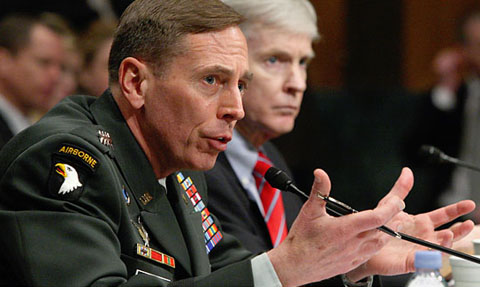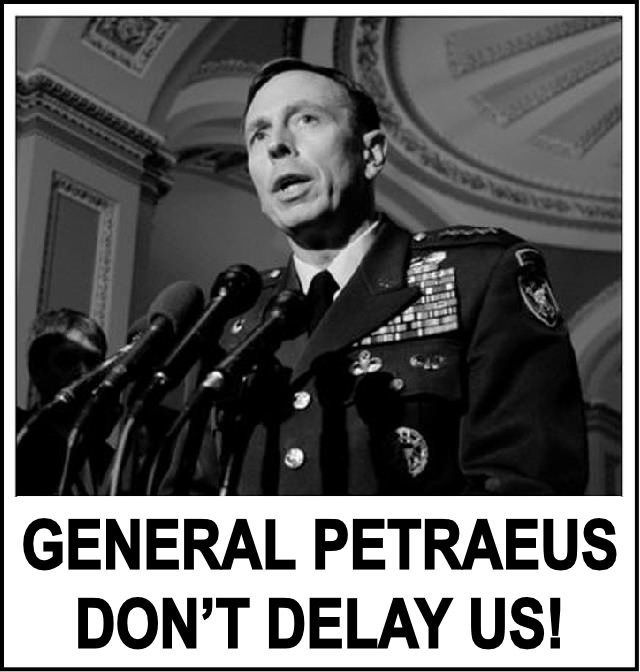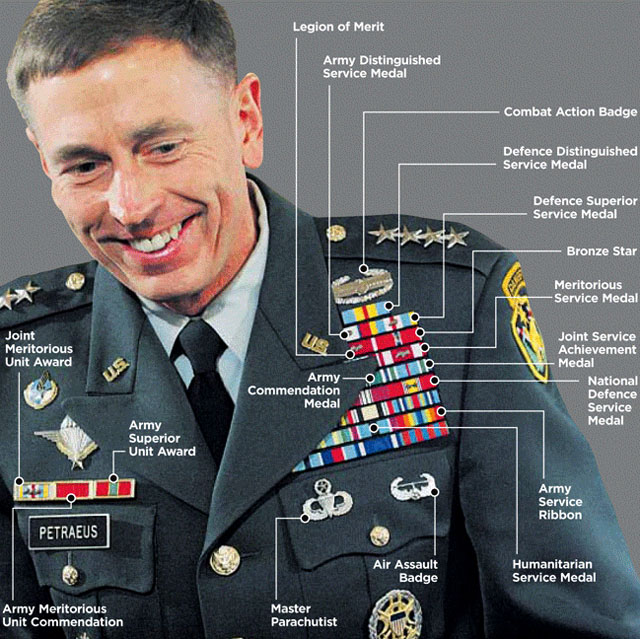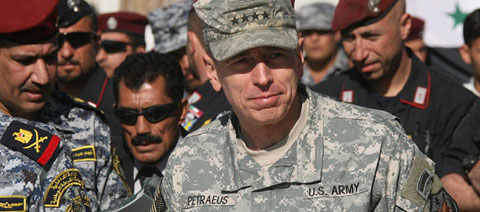www.islandbreath.org ID# 0817-11
Petraeus Points to War With Iran

image above: General David Peraeus before Senate Committee 4/8/08 from NY Times
"It's why I've repeatedly noted that we haven't turned any corners,
we haven't seen any lights at the end of the tunnel.
The champagne bottle has been pushed to the back of the refrigerator.
And the progress, while real, is fragile and is reversible."
| by Patrick J. Buchanan on 11 April 2008 in www.antiwar.com The neocons may yet get their war on Iran. Ever since President Nouri al-Maliki ordered the attacks in Basra on the Mahdi Army, Gen. David Petraeus has been laying the predicate for U.S. air strikes on Iran and a wider war in the Middle East. Iran, Petraeus told the Senate Armed Services Committee, has "fueled the recent violence in a particularly damaging way through its lethal support of the special groups." These "special groups" are "funded, trained, armed and directed by Iran's Quds Force with help from Lebanese Hezbollah. It was these groups that launched Iranian rockets and mortar rounds at Iraq's seat of government (the Green Zone) ... causing loss of innocent life and fear in the capital." Is the Iranian government aware of this – and behind it? "President Ahmadinejad and other Iranian leaders" promised to end their "support for the special groups," said the general, but the "nefarious activities of the Quds force have continued." Are Iranians then murdering Americans, asked Joe Lieberman: "Is it fair to say that the Iranian-backed special groups in Iraq are responsible for the murder of hundreds of American soldiers and thousands of Iraqi soldiers and civilians?" "It certainly is. ... That is correct," said Petraeus. The following day, Petraeus told the House Armed Services Committee, "Unchecked, the 'special groups' pose the greatest long-term threat to the viability of a democratic Iraq." Translation: The United States is now fighting the proxies of Iran for the future of Iraq. The general's testimony is forcing Bush's hand, for consider the question it logically raises: If the Quds Force and Hezbollah, both designated as terrorist organizations, are arming, training and directing "special groups" to "murder" Americans, and rocket and mortar the Green Zone to kill our diplomats, and they now represent the No. 1 threat to a free Iraq, why has Bush failed to neutralize these base camps of terror and aggression? Hence, be not surprised if President Bush appears before the TV cameras, one day soon, to declare: "My commanding general in Iraq, David Petraeus, has told me that Iran, with the knowledge of President Ahmadinejad, has become a privileged sanctuary for two terrorist organizations – Hezbollah and the Quds Force of the Iranian Revolutionary Guard – to train, arm and direct terrorist attacks on U.S. and coalition forces, despite repeated promises to halt this murderous practice. "I have therefore directed U.S. air and naval forces to begin air strikes on these base camps of terror. Our attacks will continue until the Iranian attacks cease." Because of the failures of a Democratic Congress elected to end the war, Bush can now make a compelling case that he would be acting fully within his authority as commander-in-chief. In early 2007, Nancy Pelosi pulled down a resolution that would have denied Bush the authority to attack Iran without congressional approval. In September, both Houses passed the Kyl-Lieberman resolution designating the Iranian Revolutionary Guard a terrorist organization. Courtesy of Congress, Bush thus has a blank check for war on Iran. And the signs are growing that he intends to fill it in and cash it. Israel has been hurling invective at Iran and conducting security drills to prepare its population for rocket barrages worse than those Hezbollah delivered in the Lebanon War. Adm. William "Fox" Fallon, the Central Command head who opposed war with Iran, has been removed. Hamas and Hezbollah have been stocking up on Qassam and Katyusha rockets. Vice President Cheney has lately toured Arab capitals. And President Ahmadinejad just made international headlines by declaring that Tehran will begin installing 6,000 advanced centrifuges to accelerate Iran's enrichment of uranium. This is Bush's last chance to strike and, when Iran responds, to effect its nuclear castration. Are Bush and Cheney likely to pass up this last chance to destroy Iran's nuclear facilities and effect the election of John McCain? For any attack on Iran's "terrorist bases" would rally the GOP and drive a wedge between Obama and Hillary. Indeed, Sen. Clinton, who voted to declare Iran's Revolutionary Guard a terrorist organization, could hardly denounce Bush for ordering air strikes on the Revolutionary Guards' Quds Force, when Petraeus testified, in her presence, that it is behind the serial murder of U.S. soldiers. The Iranians may sense what is afoot. For Tehran helped broker the truce in the Maliki-Sadr clash in Basra, and has called for a halt to the mortar and rocket attacks on the Green Zone. With a friendly regime in Baghdad that rolled out the red carpet for Ahmadinejad, Iran has nothing to gain by war. Already, it is the big winner from the U.S. wars that took down Tehran's Taliban enemies, decimated its al-Qaeda enemies and destroyed its Sunni enemies, Saddam and his Baath Party. No, it is not Iran that wants a war with the United States. It is the United States that has reasons to want a short, sharp war with Iran. Bush Hypes Threat from Iran By Matthew Rothschildon on 10 April 2008 in www.Progressive.org In his speech on Thursday, Bush wasted little time before getting to the ominous subject of Iran. Time and time again, he lumped the alleged threat from Iran in the same breadth as the one from Al Qaeda, once again fusing enemies in the minds of the American people. “Serious and complex challenges remain in Iraq, from the presence of Al Qaeda to the destructive influence of Iran,” he said, even before declaring that the surge has “renewed and revived the prospect of success.” A little later, he said, “Iraq is the convergence point for two of the greatest threats to America in this new century: Al Qaeda and Iran.” (Bush has now elevated Iran over China as the looming threat of the century!) And in the next paragraph, he said, “If we succeed in Iraq after all that Al Qaeda and Iran have invested there, it would be a historic blow to the global terrorist movement and a severe setback for Iran.” Al Qaeda-Iran, Al Qaeda-Iran, Al Qaeda-Iran. That is the chant emanating from the White House. But Bush was not content to be subtle about his belligerence toward Iran. Listen to the saber rattle: “The regime in Tehran also has a choice to make,” Bush said. “It can live in peace with its neighbor, enjoy strong economic and cultural and religious ties. Or it can continue to arm and train and fund illegal militant groups, which are terrorizing the Iraqi people and turning them against Iran. If Iran makes the right choice, America will encourage a peaceful relationship between Iran and Iraq. Iran makes the wrong choice, America will act to protect our interests, and our troops, and our Iraqi partners.” By “America will act,” Bush is making damn clear that he intends to go ahead and bomb Iran. We can keep telling ourselves that Bush wouldn’t be so foolish as to widen the war to Iran when the one in Iraq is going so badly. But foolishness has never stopped him before . Regard his words. They put not only Tehran on notice. They put Congress and the American people on notice. This man is planning on waging another illegal war, and we need to do all that we can, nonviolently, to stop him. |
SUBJECT: WAR WITH IRAN
SOURCE: JUAN WILSON juanwilson@mac.com
POSTED: 6 APRIL 2008 - 3:00pm HST

Not again. Not this time. Let's hear the truth.
by Juan Wilson on 6 April 2008 It would seem that just as General David Petraeus is back in Washington to drum up continued support for his strategy of perpetual surge, things are unraveling in Iraq. Internal political disputes between Shia factors have boiled over in violence. One side represents the Shia in place in Baghdad (Maliki) while the other is a representative of Iranian interests (Sadr). The showdown came in Basra, the southern oil port on the Persian Gulf near Iran. The pathetic display of force by Maliki in Basra was an embarrassment to the Baghdad leadership and the Americans who backed them. A peace deal to save Maliki was brokered by an Iranian general and the Sadr Militia was able to keep its weapons. U.S. Forces went into Sadr City, within Baghdad to close down the rocket mortar sites that have been raining destruction on the Green Zone all week. The result was Americans under attack all over the place. No matter how bright Petraeus is, he won't like taking a defeat. He'll want to take Iran before admitting he may have been following a dead-end strategy. Only problem is, we can't take Iran. The country's population is three times the size of Iraq. It has not been worn down for a decade before an invasion, as was Iraq. They are technically and militarily a more superior opponent than Iraq, with the will to fight us. Even standing at a distance and dropping ordinance from the sky will backfire badly. Hamas and other terror networks throughout the middle east will be ignited. Our tenuous position in the middle east will be over. The Senate should hold David Petraeus' feet to the fire this coming week. Then get the hell out of Iraq with some semblance of dignity. Don't wait until we have to bail out of the Green Zone in overloaded helicopters. |
SUBJECT: WAR WITH TEHERAN
SOURCE: DAVID WARD sayjaz3@hotmail.com
POSTED: 6 APRIL 2008 - 2:30pm HST
British fear US commander is beating
the drum for Iran strikes

by Damien McElroy on 5 April 2008 in The Telegraph |
'Handed Over' |
Island Breath: American attack on Iran nears 3/27/08
Island Breath: Drumbeat for War with Iran 11/2/07
Island Breath: Iran War Countdown 3/1/07
Island Breath: Put End to Iraq and Iran War 1/20/07
Island Breath: War with Iran already begun 4/14/06
